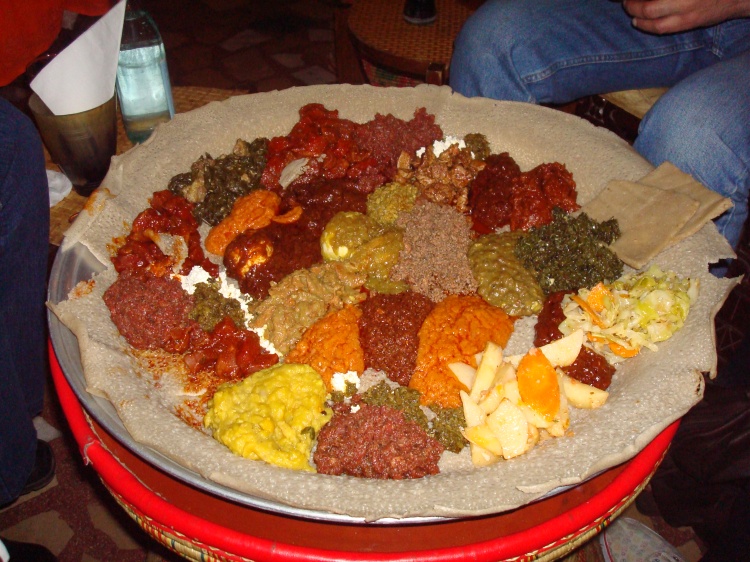The plane bounced on the tarmac when it landed in the middle of the night. The whole flight had been a stressful ordeal. I am usually a good flyer, untroubled by the physics of being in a metal canister shooting through the sky or by the occasional bumpy bit of turbulence. This EgyptAir flight to Ethiopia was a different story though. It was the first time I had been on a plane and had the sensation that the pilot was speeding. The bouncy landing on the tarmac reaffirmed my theory that this was a pilot who was in a hurry to get to Addis Ababa (and possibly was a pilot who hadn’t quite trained enough to nail the advanced difficulty landing in this capital city surrounded by mountain peaks at 10,000 feet elevation above sea level).
It was 4 a.m. when I arrived in Addis Ababa and I had no idea what to expect. I was the last person out of customs and immigration, a process which include stopping by a closet with a paper sign taped up on the door listing the prices of tourist visas, where the man behind the desk in the closet ever-so-carefully copied my information onto the visa sticker, peeled and inserted it into my passport, decided it wasn’t tidy enough and redid it. He was this thorough with each passenger.
I was eager to find my friend who had invited me out by the baggage carousels, despite the late hour. She and her family had invited me to come visit Ethiopia on my trip around the world. At the time, the decision to go had seemed obvious – I couldn’t imagine a more ideal scenario to visit Africa for the first time.
At the moment of exiting the immigration area onto official Ethiopian soil, my knowledge of Africa was based on two things: 1) The news (generally not a positive portrayal; often in reference to corruption, violence and worse) and 2) The Lion King.
To say I had ill-informed expectations is quite an understatement.
As I discovered in the light of the next day after arriving, Addis Ababa is a quickly developing international hub on the continent of Africa. This rapidly expanding modern city is the headquarters of many NGOs and political organizations from the African Union to the United Nations. It is nestled high in the mountains (and there are a lot of mountains in Ethiopia), full of coffee, roses, birds and monkeys. It has a remarkable diversity of over 80 cultures and peoples in its many regions from the Amhara and Sudanese refugees in the west to the Tigrinya and Eritrean neighbours in the north to a large Muslim population in the east in the walled city of Harar and a troubled borderland with Somalia to dozens of tribes in the Omo region in the south – and that’s not including the Rastafarians repatriated from Jamaica to the town of Shashamane and the Ethiopian Jews of Axum, the Beta Israel.
I went to hotel clubs where slightly sinister power players who wear sunglasses at night and ogling old men gather alongside the nouveau-riche and the ex-pat community to unwind and enjoy live bands. I rode in blue and white cabs, passing compound after compound of gated private residences with gate guards. We drove without working seatbelts at a maximum speed of 40km/hr, winding around pedestrians waltzing around the roads like they own the place (and they do – the penalty for killing someone in a car accident is a minimum of 15 years in prison even if it is not the driver’s fault, so there is plenty of motivation to drive safely and slowly). I was hot in the sun at the high elevation and cold in the shade. I learned I was in greatest danger of being pickpocketed in Addis; otherwise there was very little crime that affected sensible tourists. I saw a state-of-the-art park with incredible playgrounds that was forbidden to enter because a city planner put it too close to the palace. I saw two men hold hands with a goat to coax it across a street on its hind legs.
I stayed in a home decorated with art from Persia, the Arctic and Syria. I gorged on homemade Ethiopian food made by my friend’s lovely and elegant grandmother whose family had cooked for Emperor Haile Selassie, from doro wat to goat zigni to homemade injera. I also learned that being able to tie yourself or your family to the idolized and now deceased Emperor is important in Ethiopia. I was taught how to properly meet and greet people from the three cheek to cheek kisses to touching one hand to a forearm while shaking hands to standing whenever someone new enters a room, especially an elder.
And so that is the last time that I will refer to any of my experiences being of ‘Africa’, because as so many people point out and so many people tend to overlook, Africa is not a country. It is a continent and it is huge.

It has vastly different regions and cultures within its many countries and to lump them all together would be like lumping Cubans and Canadians as North Americans.
I did not experience ‘Africa’; I experienced Ethiopia. (And later, Egypt, but more on that later).


Sounds really unique and fun.